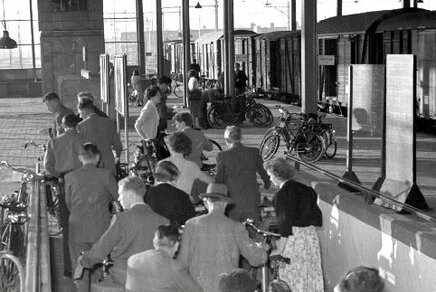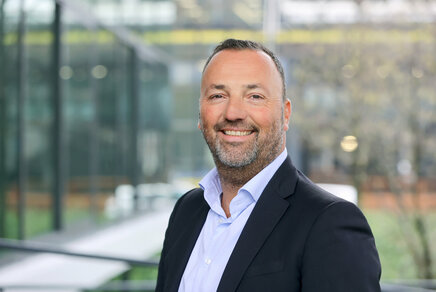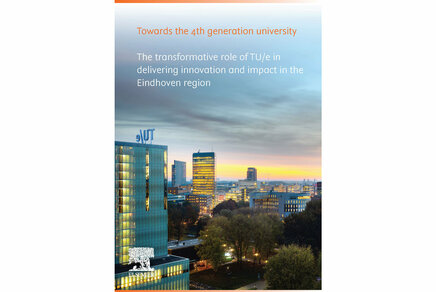Each Amber should soon replace twenty private cars
Amber's service for business aims to move away from the situation where each employee has one car.
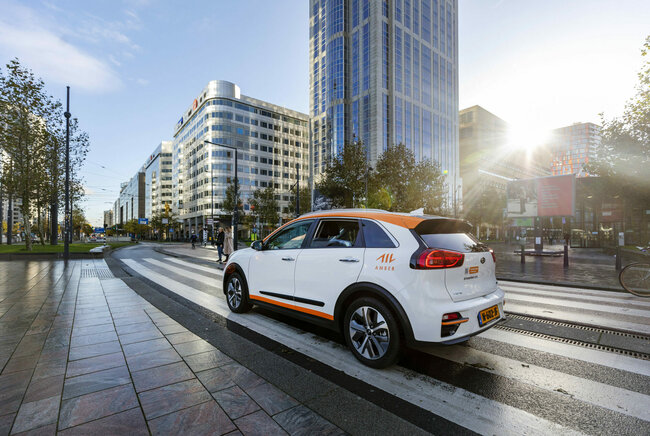
Recently, car sharing company Amber, founded by three TU/e students, and MyWheels merged. The umbrella company, the Sharing Group, is now the largest provider of shared cars in the Netherlands. Together, the companies form "the mobility system of the future", according to the CEO of MyWheels, Karina Tiekstra. Amber's goal is simple: offer shared electronic cars that, thanks to AI software and personal service, are always on hand when people need them.
A quick refresher. Amber is a tech company active in corporate shared transport. The founders of the company are three former students from the Eindhoven University of Technology who, after building two electric cars at the university, wanted to see if they could make the technology accessible to a wider public. Amber now provides flexible shared car concepts to, among others, the Dutch province of Brabant, a.s.r. and ABN Amro.
START-UPS AND SPIN-OFFS
TU Eindhoven (TU/e) is a breeding ground for new ideas that rely on scientific research. Sometimes these ideas develop into spin-offs and start-ups. This brings scientific research a step closer to society. In collaboration with The Gate and Innovation Origins, TU/e puts the spotlight every month on an innovative company that has emerged from scientific research. In episode 7: Amber.
One Amber for twenty cars
With this service for the corporate world, Amber wants to move away from a situation where every employee has one car. "Seventy percent of people in the Netherlands live and work in the city. It gets too busy there and the air is too polluted. Fewer cars will help make the city quieter and cleaner. Passenger cars are stationary 96 percent of the time," says Amber's business development manager Martijn Prins. In the near future, each Amber should be able to replace twenty cars, at the moment there are just six.
Prins: "Our proposition has only grown stronger in the past few years. All large companies are open for a conversation. Companies are all working on reducing their CO2 emissions, adapting to the new situation of working from home and saving costs. Our concept fits in seamlessly with that."
Planning algorithm
Amber has not been sitting idly by. For example, the planning algorithm has been further developed. This tool solves the puzzle of available cars, availability of fleet operators, preferred departure times and locations for each booking in order to be able to plan as many trips as possible. "Processing data takes time. We are getting more and more Ambers, more users and more new cities. So that puzzle is getting more and more complex. Our technical goal is to create a new schedule every minute."
But data also provides better insights. Where and when the most demand occurs, for a start. "We are constantly relocating cars, so we can respond effectively to that. Imagine that at around three o'clock in the afternoon, non-reserved Ambers near locations A and B are often taken for a spontaneous trip, while cars around location C are not. Let's assume that a fleet operator is in the vicinity of these locations, it is a simple matter to drive available cars near C to a location between A and B."
Last year, the company also developed a tool for complete automatic parking coverage. This tool registers the license plate of an Amber as soon as it enters a new parking zone. The system then registers the car with the appropriate permit. When leaving, the car is instantly signed out again.
‘It feels like your own car'
Whereas two years ago the company was still working with hubs and set parking spaces, they now have service areas in largest cities in the Netherlands. "You can leave your Amber anywhere and have it delivered to a service area. My ultimate Amber experience is when I drive from Eindhoven with friends to an event in Amsterdam. There we park the car, lock it and are all set. This makes it feel like your own car. And that feeling is indispensable, if people are to give up their own (lease) car.
Prins is not yet able to say much about what the merger with MyWheels will actually mean for Amber. "We need more time than two months for that. On the other hand, he does not have to think long about where the company will be in five years' time. "Amber and MyWheels will not only be market leader in the Netherlands, but in the whole of Europe. If we can serve a city like Eindhoven, why not Antwerp? It's exactly the same thing. But, we are very forward-thinking in the Netherlands when it comes to charging infrastructure. Let's hope that they will soon make steps in other countries in that respect as well."
START-UPS AND SPIN-OFFS
The first episode features DENS. This tech company makes generators that run on formic acid.
The second episode focuses on Simbeyond, which develops simulation software.
The third episode is about Aristotle, which combines software for physical and cognitive training with PSV
In the fourth episode, GOAL 3 talks about the steps needed in the fight against unnecessary mortality in Africa
In episode five, we see how Zavhy will transform the conservative construction world with 3D concrete printing.
Episode 6 tells the story of VitalFluid that uses lightning to protect crops.
Media contact
More on AI
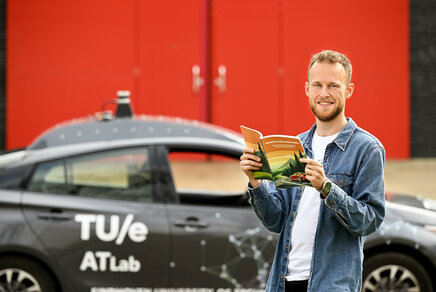
![[Translate to English:]](https://assets.w3.tue.nl/w/fileadmin/_processed_/e/1/csm_Beintema_Gerben_EE_PO_VH_4007%20%281%29_a6974ea62b.jpg)

Latest news
